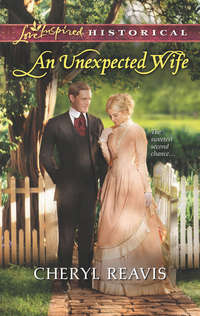
Полная версия
Harrigan's Bride
He lay the bundle on her lap. “It isn’t much. There aren’t too many things here to buy.”
She took the string off and unrolled enough of the muslin wrapping to reveal a green book. The title was printed diagonally across it in gold leaf: The Scottish Chiefs. It was beautiful.
“The story of William Wallace, by Miss Jane Porter. I always wanted to read this,” she said. “There was only one copy at school. I never got the chance.”
“I thought maybe you’d had enough of men writers and you’d like a woman’s perspective for a change.”
She smiled, running her fingers over the exquisitely tooled designs in the green leather cover—ivy and oak leaves and acorns, an exotic bird with long tail feathers that curved down across the banner with the title. She looked up at him. She loved books—almost as much as she loved him. “Thank you, Thomas.”
“And the other thing…” He lifted a knitted white wool shawl with a delicate lace edge free of the muslin. “It’s…well, it isn’t much, but I hope you like it.”
She leaned forward so that he could drape it around her shoulders. “It’s beautiful. Thank you again. I wish I had something for you.”
“Not necessary,” he said, pulling the chair around and sitting down again. “There’s one more thing here.” He unfolded the muslin the rest of the way, and took out an envelope. “This is the name of my lawyer in Boston. And the one here in Falmouth who will take care of your expenses. I’ve included my mother’s address in Maryland, if you should need to contact her. And there’s a copy of my will.” He was very careful not to look at her. “There’s also a note with my proper address. I would like it very much if you would write to me if—when—you feel up to it.”
“You’re in the wrong army, Thomas. How…?”
“There’s a chance that a letter will get to me as long as Falmouth remains in Union hands.” He finally let his eyes meet hers.
So sad, she thought. Still so sad. She nodded, because she didn’t trust her voice and because she was so tired.
“I’ve brought your toddy, Miss Abiah,” Gertie said from the doorway, making a much less startling entrance than La Broie had. “And some very fine sipping whiskey for you, Captain Harrigan—from Mr. Zachariah Wilson, you might say. A little something to mark the occasion.”
“Does Mr. Zachariah Wilson know how generous he’s being, by any chance?”
Gertie laughed. “Well, sir, if you run into him on your way out, I wouldn’t thank him for it, if I was you.” She set the tray down on the table by the bed and quietly left.
“What is this, Abby?” he asked, handing her the flowered teacup.
“Hot milk, honey—and brandy. Every three hours, just like clockwork. I’ve been promoted from chicken broth.”
“Well,” he said, lifting his glass to her. “It could be worse.”
They both drank. She was more used to her beverage than he was to his.
“I’m going to have to have help getting on my horse,” he said.
“I guess that’s what groomsmen are for.”
“Well, not these groomsmen. If I have to depend on them, I’ll surely have to walk.”
She smiled, feeling the awkwardness between them growing by leaps and bounds.
My husband, she thought. Then, Thomas, what have you done?
He didn’t say anything else, and neither did she. The silence between them lengthened as the revelry in the kitchen grew louder. Laughter. Singing. The smell of bread. She was glad someone found this a merry occasion. She and Thomas might as well be the chief mourners at a wake.
A log fell in the fireplace. The clock ticked quietly on the mantel.
“Thomas—”
“No more talking,” he said, taking her cup away. “Rest. Go to sleep, if you can. I’ll sit here by you until I have to go.”
“Thomas—” she began again.
“No more talking,” he insisted. “This wedding was supposed to be for your good. I don’t want it to make you worse.”
“I’d like to see inside the cedar chest. Could you open it?”
“There’s no key.”
“Force the lock, then.”
He sat for a moment, then did as she asked, first trying to open it with his bare hands and then the edge of the shovel from the fireplace.
“This is going to ruin it, Abiah,” he said after a moment.
“Please, Thomas. Open it.”
The lock finally gave, with a minimal amount of the wood splintering. She raised up on one elbow to look inside. Everything appeared to be there, even the gray uniform jacket and the saber she’d packed away on top. She realized that Thomas was looking at them.
“Guire’s things,” she said, and he nodded. She lay back against the pillows suddenly and closed her eyes, more exhausted than she realized. Thomas closed the chest.
When she opened her eyes, he was once again sitting by the bed.
“Abby,” he said, when he realized she was looking at him. “If you should hear from my grandfather, don’t let him bully you.”
“I don’t think there’s anything for your grandfather to bully me about, Thomas—except perhaps my politics.”
“Oh, the judge would find something, believe me.”
“Then I promise I’ll be every bit as obstinate as you would be.”
He looked at her a moment, then abruptly smiled.
“Go to sleep, Abiah,” he said again, the smile still lingering at the corners of his mouth.
“No,” she said. “I’ll have plenty of time to sleep later. Talk to me.”
“Are you warm enough? Shall I put more wood on the fire?”
“Don’t do that. Don’t remind me that I’m an invalid. Talk to me the way you used to when you came home with Guire.”
“Shall I take the book away?” he asked, still intent on being solicitous.
“Thomas!” she said in exasperation. “Tell me about…about your family.” It wasn’t what she meant to ask at all. She had meant to ask about the woman he had really wanted to marry, but at the last moment, she lost her nerve.
He gave a resigned sigh. “What do you want to know?”
“Anything. Everything.”
“I don’t know ‘everything.’ The Winthrops aren’t like the Calders. There’s no openness, no…”
“What?” she asked, when he didn’t go on.
“I was going to say affection. But I supposed there is some. We’re just very careful to keep it hidden—as if caring for someone was some kind of weakness in our character. The judge does care for my mother—at least I think he does, in his way, or he wouldn’t have let her come back home.”
“But he doesn’t care for you?”
“No. Never for me.”
“Why not?”
“I did the unforgivable.”
“And what was that?” she asked, determined to get whatever information from him she could.
“I was born. I am my father’s son. That alone is sin enough.”
She looked at him, and she made no token protests. It would be presumptuous of her to try to talk him out of his conclusions about the judge. Thomas understood the situation far better than she did. She had only to look into his sad eyes to know that. She wondered if he ever heard from the father who had abandoned him—but she didn’t ask about that, either.
“What is the house like? The one in Maryland,” she asked instead, turning to at least some of the things she’d always wanted to know.
“Big. Ostentatious, actually. Very much in keeping with the judge’s idea of his status in society. It’s always full of luminaries of one kind or another. The judge is very fond of holding salons. Everyone who is anyone strives to be invited, I believe—which is understandable. He is much more agreeable to the strangers who come to his house than he is to his family.” Thomas was looking away from her when he said it, seeing again, she thought, that big—and lonely—house in Maryland.
“I’m sorry,” she said.
He looked at her. “Don’t be. My family is what made me appreciate yours so. Miss Emma and Guire. I will miss them all the rest of my life.” He suddenly reached out and took her hand. “Go to sleep,” he said pointedly. “I can see how tired you are.”
“I’m not,” she insisted. “Truly…”
But she must have been. When she opened her eyes again, the room was dark except for the glow from the embers in the fireplace. The chair where Thomas had been sitting was empty. The room had grown cold. There was no smell of burning wax. The candle had been out for a long time.
She struggled to sit up in bed, trying hard not to cry. She had wanted to be awake when Thomas left. She had wanted to tell him…
No. Perhaps it was better this way. No awkward goodbyes. No…anything.
She was still wearing the shawl he had given her, and she hugged it closer to her and lay back against the pillows. What if she never saw him again? What if—
She turned her head sharply at a sound on the other side of the door—a heavy thump, as if something or someone had fallen against it. She raised up on her elbow, listening intently, and just when she was about to lie down again, she heard a voice.
“Please!”
A woman’s voice. Gertie’s voice.
There were more scuffling noises—and a man speaking in muffled and angry tones. Abiah could hear him, but she couldn’t understand the words.
“Gertie?” she called, growing more alarmed now.
She jumped at another loud thump against the door. The doorknob rattled.
“Gertie!” Abiah yelled. She shoved back the heavy quilt and slid her legs over the edge of the bed. The room swam around her. She had to sit there until the dizziness subsided.
And all the while the struggle outside the door continued.
Abiah slid to the floor and went directly for the cedar chest, flinging it open and tearing through the starched linens and dresser scarves inside.
“Where is it?” she whispered, throwing piece after piece onto the floor. “Where is it!”
If it was gone, she’d take Guire’s saber—if she could lift it. She’d have to.
Abiah abruptly stopped looking. Gertie was crying. She could hear her plainly.
Dear God, what’s happening!
Abiah was frantic now, running her hands among the remaining sheets. Her fingers finally touched cold metal. She dragged Guire’s Colt revolver out, carrying it with both hands to the fireplace—the only source of light—so she could see. She had hated the thing, hated when Guire insisted that she learn to shoot it because he was away at school and she and their mother were isolated and alone.
She felt so weak suddenly, and she went down on both knees on the hearth, breathing heavily. The revolver slid out of her hands. She stayed where she was, her head bent low until she could pick up the gun again. Then took a deep breath and held it closer to the firelight, where she could see. It was still loaded.
She forced herself to her feet again, holding on to the furniture and then to the wall to get to the door. She didn’t hesitate—she could hear Gertie sobbing still. Abiah opened the door wide and stepped unsteadily into the hall. The too-long sleeve of her nightgown kept sliding down and covering the Colt.
There was no one in the hallway now.
She heard Gertie give a muffled cry somewhere to her left. Something fell and broke. Abiah went in that direction, holding the revolver with one hand and leaning heavily against the wall with the other. She had to keep stopping to rest, but she was determined to go on.
The man had Gertie down on the kitchen floor, and he was so intent on what he was doing that he didn’t hear Abiah. She brought the revolver up and pulled back the hammer. It was that noise that got his attention. He abruptly looked around. Only one lamp had been lit, and she couldn’t see his face distinctly.
“Move away from him, Gertie,” Abiah said, stepping closer to the end of the kitchen table so she could lean against it.
Gertie tried to stop crying, tried to cover herself. She made an attempt to scramble aside, but the man caught her wrist and struck her hard.
“Stop it!” Abiah cried.
He didn’t stop. Gertie was struggling, he hit her again.
“Stop it! I mean it!”
When he raised his hand the third time, Abiah pulled the trigger. The revolver misfired. She gave a soft cry of alarm and fumbled to pull back the hammer. Her sleeves were in the way. Her hands were shaking, but she held on.
The revolver misfired again.
“I never knew whores stuck together,” the man said, still holding Gertie down.
But then he was getting slowly to his feet. Abiah didn’t dare take her eyes off him.
“What are you going to do now, whore?”
“I’ve got…four more chances…to send you to hell,” Abiah said. Her entire body trembled from the physical strain. “If you don’t get out of here, I intend to use them…all.”
“She owes me, damn you!” the man said. “Come to think of it, so do you.” He lunged suddenly in Abiah’s direction, taking her completely by surprise, but not before she pulled the trigger again. There was a loud roar this time, and the man reeled away from her and fell heavily on the floor. Gertie screamed, and Abiah collapsed against the rough kitchen table and slid to her knees. The heavy revolver tumbled out of her hand. She had to cling to the edge of the table to keep from falling on her face.
“Oh, Miss Abiah! What have you done?”
Abiah found Gertie’s question entirely beyond her comprehenion. She still held on to the edge of the table, trying hard to stay upright, trying to stop trembling.
It was raining again. She could hear it.
How strange, she thought, that she should take note of that.
Happy is the bride the sun shines on today.
And she suddenly thought she heard Guire’s voice.
“What?” she whispered.
I mean it, Abby. Don’t you ever aim this gun at anything if you don’t mean to kill it.
“What?” she whispered again. “What did you say?”
“Miss Abiah, stand up! We have to get out of here!”
“No, I can’t, Gertie—”
“You have to! Get up! Now!”
Abiah tried to do what Gertie wanted. She pulled hard on the edge of the table in an effort to get to her feet. The man was no longer lying on the floor where she had seen him fall. She closed her eyes for a moment, trying to understand. She didn’t know what was real anymore. And at this point, she had no idea which would be worse—to be out of her head again and to have imagined it all—perhaps even her marriage to Thomas—or to have killed a man.
She looked up at Gertie. One eye was bruised and swollen nearly shut.
Not a dream then.
“Is he…dead?” Abiah asked, her voice trembling.
“Carl says not,” Gertie said.
“Carl?”
“He’s the hired man. He came when the gun went off.”
“I…really shot someone?”
“Close enough.”
“Where—where is he?”
“I don’t know. Come on, Miss Abiah. We have to get out of here.”
“No, we have to let somebody know what happened. Mr. Wilson, or his wife. Somebody needs to know about that man.”
Gertie gave a sharp sigh and stopped pulling on her arm. “Miss Abiah,” she said in exasperation, “Zachariah Wilson is that man.”
“What?” Abiah said, no longer trying to get up.
“You shot our landlord, Miss Abiah. Not that anybody is going to believe that even if you tell them—not with the likes of me standing right here beside you.”
“But—”
“Miss Abiah, there ain’t no use talking about it. We have to get out of this house. We don’t wait until the rain stops. We don’t even wait until the sun comes up. We go. Understand?”
Chapter Four
“Mind what you do with your face, Cap.”
Thomas gave the sergeant a look in spite of the admonishment. The effects of his groomsmen’s brandy had long since worn off, and the last thing he needed was to be instructed on his demeanor.
“The boys are ready to drop where they stand, sir,” La Broie persisted. “You got to show them it ain’t as bad as they think it is.”
“Oh, it’s nowhere near as bad as they think it is,” Thomas said. “It’s goddamn worse.”
He had his own struggle to keep from dropping, and perhaps the only deterrent was the fact that he was standing in mud—and who knew what else—nearly to his knees. The roads had become completely impassible. He had long since given up trying to ride his exhausted mount; a horse mired in mud to its belly was completely useless. He walked like the rest of them, and every muscle in his body ached. He was shivering with the cold. He was hungry. And the rain. God, the rain.
The beginning of their little jaunt to surround the Confederates and utterly vanquish them began auspiciously enough, but by the first evening, the weather turned foul and stayed that way. By now they had been standing in a downpour for what seemed like hours, waiting for somebody up the line to decide what this dog-wet and mud-caked excuse for an army was going to do, and all the while it was common knowledge that they were giving Lee and his crowd the biggest laugh of their military careers.
There was a loud commotion up ahead, shouts and the neighing of distressed horses—another overturned baggage wagon. Thomas took a moment to indulge himself in a colorful assessment of General Burnside’s family tree.
“He is that, sir,” La Broie said appreciatively. “Indeed he is.”
“Let’s go, La Broie. And you can keep your remarks to yourself,” Thomas said, forcing himself to begin a pass along the line to hand out words of encouragement he didn’t begin to feel.
“Sir—” La Broie said.
“I know, La Broie! Mind my face.”
Thomas had an admirably disciplined company, now—something he could only accredit to La Broie’s reputation as an Indian fighter and his consummate ability to put the fear of God into a man with hardly more than a look. Unlike some of the other, more demoralized companies, this one was all present and accounted for. And it was safe to say that La Broie was the reason the men still had their “gum blankets” as well, that all-purpose piece of equipment that could be worn to keep the rain off or slept upon as a barrier to the wet ground.
Regardless of the fact that no one had been paid in recent memory, not a single man had dared give in to his craving for tobacco or whiskey by selling or bartering his blanket. So here they all stood, correctly outfitted for the weather, exactly by the book. Even so, it struck Thomas as he began his inspection that there was something entirely ludicrous about grown men standing out in the rain, apparently for no other reason than to make a great show of ignoring it.
“Rathbone,” he said, stopping in front of one of the privates who had been so recently wounded at Fredericksburg and who had refused to be left behind. “How is the hand?”
“It’s doing the best it can, sir,” Rathbone assured him.
“So are we all, Private,” Thomas said, drawing a few polite chuckles among those within earshot. “Anything you need?”
“Just my dear mother’s apple pie, sir.”
Thomas smiled and moved on, the remark immediately drawing his thoughts to a winter afternoon at the Calder house. Abiah and the apple pie she’d made and baked and finally cut for him in Miss Emma’s kitchen. He tried to imagine Elizabeth in that same situation—wearing an apron, laughing and completely unmindful of the flour on her nose.
Elizabeth. What was she doing now? he wondered. Did she still attend the judge’s salons? Probably so. She dearly loved the attention her presence always garnered, and there was no reason why she shouldn’t don yet another new satin frock and go. No one there would know she had broken her engagement to the judge’s grandson. No one there even knew there had been an engagement. At her insistence, he hadn’t mentioned it to anyone—except in his last impulsive letter to Guire Calder.
Thomas still didn’t know what had happened to cause her abrupt change of heart, but as far as he was concerned, Elizabeth was safe from any further revelations on his part. Somehow it didn’t matter anymore, and the fact that he’d been a consummate fool where she was concerned was something he would just as soon keep to himself.
Конец ознакомительного фрагмента.
Текст предоставлен ООО «ЛитРес».
Прочитайте эту книгу целиком, купив полную легальную версию на ЛитРес.
Безопасно оплатить книгу можно банковской картой Visa, MasterCard, Maestro, со счета мобильного телефона, с платежного терминала, в салоне МТС или Связной, через PayPal, WebMoney, Яндекс.Деньги, QIWI Кошелек, бонусными картами или другим удобным Вам способом.







